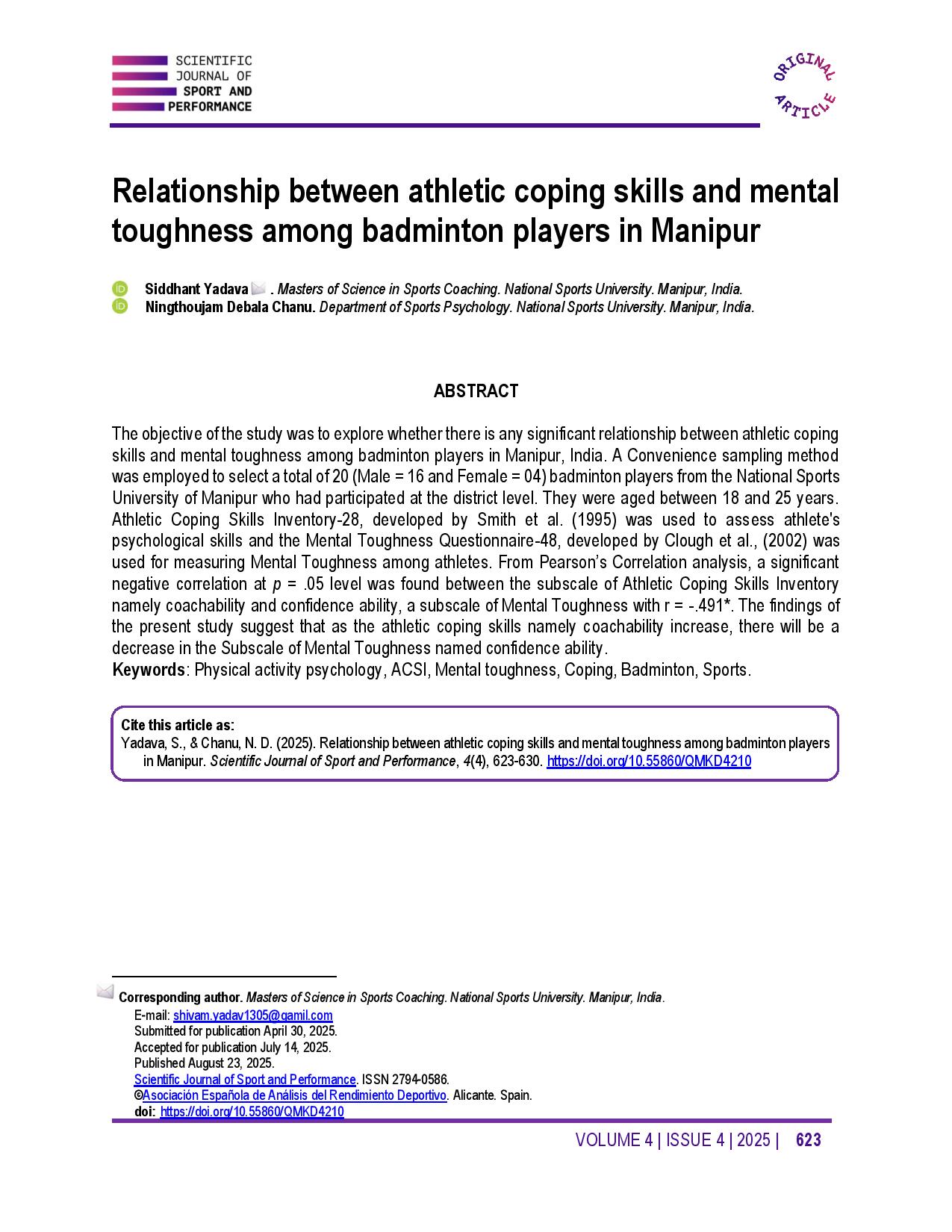Relationship between athletic coping skills and mental toughness among badminton players in Manipur
Main Article Content
Abstract
The objective of the study was to explore whether there is any significant relationship between athletic coping skills and mental toughness among badminton players in Manipur, India. A Convenience sampling method was employed to select a total of 20 (Male = 16 and Female = 04) badminton players from the National Sports University of Manipur who had participated at the district level. They were aged between 18 and 25 years. Athletic Coping Skills Inventory-28, developed by Smith et al. (1995) was used to assess athlete's psychological skills and the Mental Toughness Questionnaire-48, developed by Clough et al., (2002) was used for measuring Mental Toughness among athletes. From Pearson’s Correlation analysis, a significant negative correlation at p = .05 level was found between the subscale of Athletic Coping Skills Inventory namely coachability and confidence ability, a subscale of Mental Toughness with r = -.491*. The findings of the present study suggest that as the athletic coping skills namely coachability increase, there will be a decrease in the Subscale of Mental Toughness named confidence ability.
Article Details

This work is licensed under a Creative Commons Attribution-NonCommercial-ShareAlike 4.0 International License.
References
Anizu, M., Kumaraswamy, N., Singh, R., & Rusli, M. (2003, July). Mental toughness profile as one of predictor of injuries among Malaysian professional football players. Paper presented at the Seminar Kebangsaan Memperkasakan Sistem Pendidikan, Johor Bahru, Malaysia.
Birch, P. D. J., Crampton, S., Greenlees, I., Lowry, R., & Coffee, P. (2017). The Mental Toughness Questionnaire-48: A re-examination of factorial validity. International Journal of Sport Psychology, 48, 331-355.
Casanova, M. P., Nelson, M. C., & Baker, R. T. (2020). Examining the psychometric properties of the Athletic Coping Skills Inventory and Brief COPE in the firefighter population. Cogent Social Sciences, 6(1), Article 1761509. https://doi.org/10.1080/23311886.2020.1761509 DOI: https://doi.org/10.1080/23311886.2020.1761509
Clough, P. J., & Strycharczyk, D. (2012). Developing mental toughness: Improving performance, wellbeing and positive behaviour in others. Kogan Page.
Clough, P., Earle, K., & Sewell, D. (2002). Mental toughness: The concept and its measurement. In I. Cockerill (Ed.), Solutions in sport psychology (pp. 32-45). Thomson.
Crocker, P. R. E., Kowalski, K. C., & Graham, T. R. (1998). Measurement of coping strategies in sport. In J. L. Duda (Ed.), Advances in sport and exercise psychology measurement (pp. 149-161). Fitness Information Technology. Retrieved from [Accessed 2025, 08 August]: http://hdl.handle.net/10603/363703
Jones, G., Hanton, S., & Connaughton, D. (2002). What is this thing called mental toughness? An investigation of elite sport performers. Journal of Applied Sport Psychology, 14(3), 205-218. https://doi.org/10.1080/10413200290103509 DOI: https://doi.org/10.1080/10413200290103509
Joseph, P. T. (2021). Effect of psychological skills training on performance and mental skills of badminton players. [Doctoral dissertation, Mahatma Gandhi University]. Shodhganga.
Kobasa, S. C. (1979). Stressful life events, personality, and health: An inquiry into hardiness. Journal of Personality and Social Psychology, 37(1), 1-11. https://doi.org/10.1037/0022-3514.37.1.1 DOI: https://doi.org/10.1037//0022-3514.37.1.1
Lazarus, R. S., & Folkman, S. (1984). Coping and adaptation. In W. D. Gentry (Ed.), The handbook of behavioral medicine (pp. 282-325). Guilford Press.
Lazarus, R. S., & Folkman, S. (1984). Stress, appraisal, and coping. Springer.
Loehr, J. E. (1986). Mental toughness training for sports: Achieving athletic excellence. S. Greene Press.
Maddi, S. R., & Kobasa, S. C. (1984). The hardy executive: Health and stress. Dow Jones-Irwin.
Phomsoupha, M., & Laffaye, G. (2015). The science of badminton: Game characteristics, anthropometry, physiology, visual fitness and biomechanics. Sports Medicine, 45(4), 473-495. https://doi.org/10.1007/s40279-014-0287-2 DOI: https://doi.org/10.1007/s40279-014-0287-2
Singh, N., Singh, K. P., Burande, P. B., & Meena, T. R. (2025). A comparative study on mental toughness among basketball and badminton players. International Journal of Physical Education and Sports, 10(1), 1-4.
Smith, R. E., & Christensen, D. S. (1995). Psychological skills as predictors of performance and survival in professional baseball. Journal of Sport and Exercise Psychology, 17(4), 399-415. https://doi.org/10.1123/jsep.17.4.399 DOI: https://doi.org/10.1123/jsep.17.4.399
Smith, R. E., Schutz, R. W., Smoll, F. L., & Ptacek, J. (1995). Development and validation of a multidimensional measure of sport-specific psychological skills: The Athletic Coping Skills Inventory-28. Journal of Sport and Exercise Psychology, 17(4), 379-398. https://doi.org/10.1123/jsep.17.4.379 DOI: https://doi.org/10.1123/jsep.17.4.379




